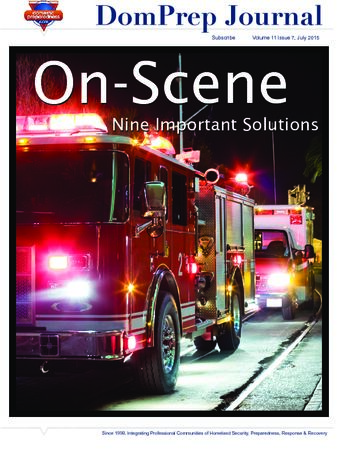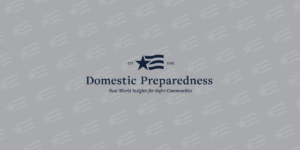

National Laboratory Support for First Responders’ Biodetection Needs
Richard Ozanich and Cynthia J. Bruckner-Lea
July 29, 2015
In an ever-changing biological environment, laboratory support is necessary to help responders identify, categorize, and manage incidents involving biological threats. The Pacific Northwest National Laboratory is one source that provides valuable testing data to help today’s first responders collect, screen,identify, and ultimately protect against such threats.

U.S. Food & Drug Administration (FDA) Food Defense and Emergency Coordination Update – New Food Related Emergency Exercise
Domestic Preparedness
July 27, 2015
The U.S. Food and Drug Administration (FDA) is making available a new food related emergency exercise to help public health and other officials understand and coordinate their roles and responsibilities, and prepare for a food-related emergency.

Local Public Health’s Role in Large-Scale Chemical Incidents
Rachel Schulman
July 22, 2015
Public health departments play, or have the ability to play, a key role in large-scale incidents caused by hazardous materials. By clearly defining their roles and collaborating with local partners, health departments have the ability to help emergency planners and responders prevent, mitigate, plan for, and respond to chemical hazards and incidents.

Response Management: Back to Basics
Stephen Grainer
July 22, 2015
When a seemingly unrealistic incident occurs, emergency managers must be equipped with the base knowledge necessary to respond to the previously unknown scenario. Acronyms are a good way to remember what to do when stress levels are high and time is short. By getting back to the basics, managers are better equipped to respond and to protect their communities.

No Defensive Strategy to Address a Growing Terrorist Threat
Richard Schoeberl
July 22, 2015
As the Islamic State group increases its threats around the world, the United States is grossly
unprepared to track radicalized members and sympathizers, or to even know how many there are in the
United States and abroad. At this point, an international coalition effort is the best hope for
thwarting this unpredictable, yet ever-growing, “lawless” group.

Superheroes in Waiting: Emergent First Responders
Wayne Bergeron
July 15, 2015
Although they may not want to be called “heroes,” military members and veterans can fill a critical gap in emergency and disaster response. Their unique qualities of training, discipline, leadership, and teamwork make them the perfect emergent responder either as a member of an organized team, or simply by being in the right place at the right time.

Dangerous Suicides
Stuart K. Cameron
July 15, 2015
Although most suicides injure only the suicide victims themselves, others may cause injury to anyone within close proximity. With law enforcement officers typically being the first on the scene of such incidents, they should be aware of the hazards and be able to recognize the signs of potential residual threats.

What It Takes to Be a Public Health Emergency Preparedness Professional
Raphael M. Barishansky
July 15, 2015
In the relatively young subspecialty of public health emergency preparedness, effective public health preparedness managers mustentify the essential elements of their roles and the skills or requirements necessary to be effective in their positions. Although there is no set recipe for success, diverse and field-related skills are a must.

Virtual Exercises – A Cost-Effective Option
Dawn Thomas
July 14, 2015
Some exercises require a hands-on environment, whereas others can thrive in a virtual training space. FUSION X is one federally sponsored exercise that has evolved from a tabletop event at a single location to a virtual training for participants, who require flexibility and cost-effectiveness, at various locations throughout the United States.

Operation Twister – Exercising Disaster Behavioral Response
Craig DeAtley
July 8, 2015
Functional exercises are invaluable for helping participants understand their roles in disasters. This is particularly true for participants who normally are not included in interagency exercises, such as behavioral health

